The NZXT N7 Z490 Motherboard Review: From A Different Direction
by Gavin Bonshor on October 7, 2020 10:30 AM EST- Posted in
- Motherboards
- Intel
- ASRock
- NZXT
- Z490
- Comet Lake
- Intel 10th Gen
- i7-10700K
- N7 Z490
System Performance
Not all motherboards are created equal. On the face of it, they should all perform the same and differ only in the functionality they provide - however, this is not the case. The obvious pointers are power consumption, POST time and latency. This can come down to the manufacturing process and prowess, so these are tested.
For Z490 we are running using Windows 10 64-bit with the 1909 update.
Power Consumption
Power consumption was tested on the system while in a single MSI GTX 1080 Gaming configuration with a wall meter connected to the power supply. This power supply has ~75% efficiency > 50W, and 90%+ efficiency at 250W, suitable for both idle and multi-GPU loading. This method of power reading allows us to compare the power management of the UEFI and the board to supply components with power under load, and includes typical PSU losses due to efficiency. These are the real-world values that consumers may expect from a typical system (minus the monitor) using this motherboard.
While this method for power measurement may not be ideal, and you feel these numbers are not representative due to the high wattage power supply being used (we use the same PSU to remain consistent over a series of reviews, and the fact that some boards on our testbed get tested with three or four high powered GPUs), the important point to take away is the relationship between the numbers. These boards are all under the same conditions, and thus the differences between them should be easy to spot.
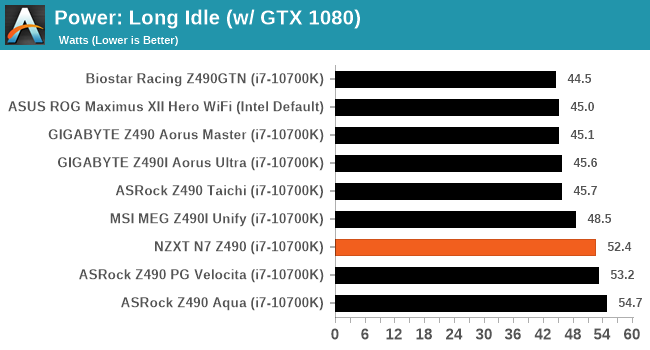
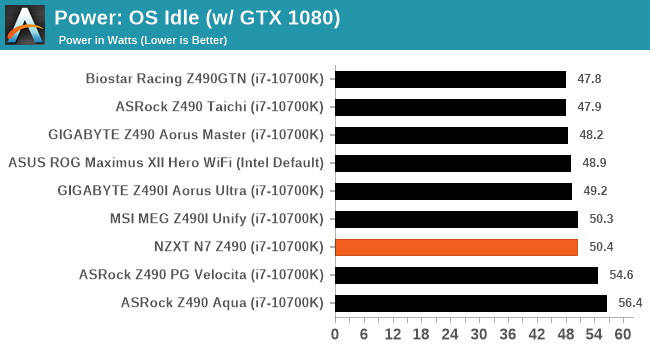
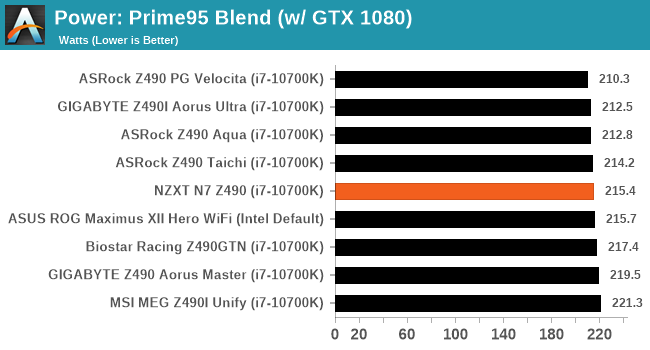
Like a few of our ASRock boards, power consumption at idle is higher than others. But at load that evens out.
Non-UEFI POST Time
Different motherboards have different POST sequences before an operating system is initialized. A lot of this is dependent on the board itself, and POST boot time is determined by the controllers on board (and the sequence of how those extras are organized). As part of our testing, we look at the POST Boot Time using a stopwatch. This is the time from pressing the ON button on the computer to when Windows starts loading. (We discount Windows loading as it is highly variable given Windows specific features.)
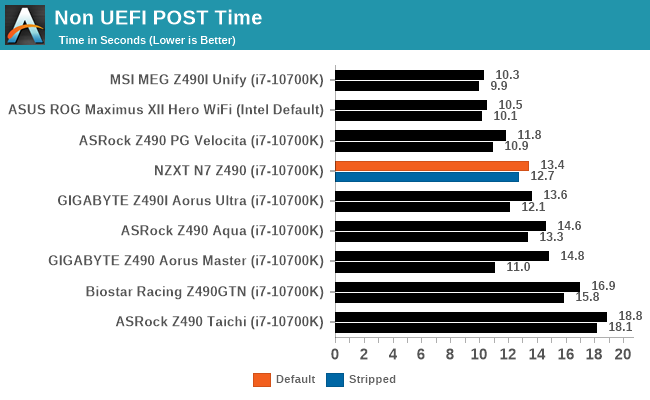
POSTing time is in the better half of the table.
DPC Latency
Deferred Procedure Call latency is a way in which Windows handles interrupt servicing. In order to wait for a processor to acknowledge the request, the system will queue all interrupt requests by priority. Critical interrupts will be handled as soon as possible, whereas lesser priority requests such as audio will be further down the line. If the audio device requires data, it will have to wait until the request is processed before the buffer is filled.
If the device drivers of higher priority components in a system are poorly implemented, this can cause delays in request scheduling and process time. This can lead to an empty audio buffer and characteristic audible pauses, pops and clicks. The DPC latency checker measures how much time is taken processing DPCs from driver invocation. The lower the value will result in better audio transfer at smaller buffer sizes. Results are measured in microseconds.
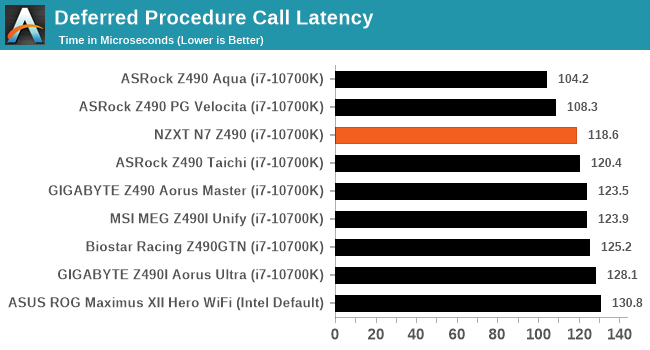
DPC Latency is also quite good, matching the other ASRock boards tested.










45 Comments
View All Comments
jabber - Thursday, October 8, 2020 - link
Now if only we could get a new power delivery/connector standard and we could move on from the 20th century.PeachNCream - Friday, October 9, 2020 - link
Shroud covering the PCB seems functionally unnecessary and likely adds cost or causes the manufacturer to believe the covering gives the motherboard a more "premium" feel and therefore somehow justifies an increased MSRP. Either way, I would prefer a motherboard that focuses strictly on functionality and value akin to those you find in OEM business desktop PCs that are still available five or more years later as refurb/resales on ebay. Give me that kind of look and reliability instead of a childish gimmick.80-wattHamster - Saturday, October 10, 2020 - link
Sounds like you want an ASUS CSM board. https://www.asus.com/us/Motherboards/CSM-Corporate...gayathri - Tuesday, October 13, 2020 - link
<a href="https://liageorson.com/">computer hardware</a>gayathri - Tuesday, October 13, 2020 - link
<a href="https://liageorson.com//">computer hardware</a>